|
Books Should Be Free Loyal Books Free Public Domain Audiobooks & eBook Downloads |
|
|
Books Should Be Free Loyal Books Free Public Domain Audiobooks & eBook Downloads |
|
Top Authors |
|---|
|
Book type:
Sort by:
|
By: Amy Wilson Carmichael (1867-1951) | |
|---|---|
 From Sunrise Land
From Sunrise Land
One of the most renowned of all Protestant Christian missionaries, Amy Carmichael is remembered most for the fifty-five years she spent doing evangelistic and philanthropic work in India. She began her missions career, however, with fifteen months in Japan before falling ill, returning to Ireland, and then returning to Asia with her focus on India. This collection of letters is a record of that time in Japan, and is fascinating not only for its biographical interest but also for its insights into... | |
By: An Elector | |
|---|---|
 A Review and Exposition, of the Falsehoods and Misrepresentations, of a Pamphlet Addressed to the Republicans of the County of Saratoga, Signed, "A Citizen"
A Review and Exposition, of the Falsehoods and Misrepresentations, of a Pamphlet Addressed to the Republicans of the County of Saratoga, Signed, "A Citizen"
| |
By: An Oxonian | |
|---|---|
 Thaumaturgia
Thaumaturgia
| |
By: Anacreon (582 BCE-485 BCE) | |
|---|---|
 Ode 7
Ode 7
volunteers bring you 19 recordings of Ode 7 by Anacreon, translated by Sir Thomas Moore. This was the Weekly Poetry project for August 14, 2022. ----- The more things change, the more they stay the same. Written sometime around 500 BC, this little poem expresses the desire to live life to the fullest with the time one has left. Here's to gray hair and the autumn of one's life! - Summary by TriciaG | |
By: Anatole Cerfberr (1835-1896) | |
|---|---|
 Repertory Of The Comedie Humaine, Complete, A — Z
Repertory Of The Comedie Humaine, Complete, A — Z
| |
 Repertory of the Comedie Humaine
Repertory of the Comedie Humaine
| |
By: Anatole France (1844-1924) | |
|---|---|
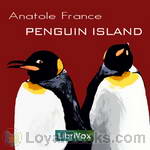 Penguin Island
Penguin Island
An old monk is tricked by the Devil into undertaking a voyage to a remote island to save the souls of thousands who live there. He arrives on the island which is actually a desolate one, inhabited only by colonies of millions of penguins. The old monk whose eyesight and hearing are almost nonexistent, mistakes them for humans and begins baptizing them. In Heaven, God finds Himself in a dilemma; the old monk's unwavering faith compels him to regard the baptisms as genuine. However, in Christian theology, only humans have souls – hence God is forced to grant the thousands of newly baptized penguins with souls! This is the beginning of their journey into “civilization... | |
 The Life of Joan of Arc, Vol. 1 and 2
The Life of Joan of Arc, Vol. 1 and 2
| |
 Thais
Thais
The fourth century ascetic Paphnuce, journeys from his remote desert hermitage to urban Alexandria determined to locate the stunningly beautiful and libertine actress, Thais. He earnestly desires that she convert to Christianity. Gaining an audience by deception, the hermit passionately speaks to the actress of eternity. Remarkably, Thais repents and retires to a convent for the rest of her days. The hermit however, cannot rid his mind of her charms, not even with the help of the most severe austerities. After years of anguish the monk learns of Thais' immanent demise and hastens to her side. There he confesses the unspeakable. | |
 Gods are Athirst
Gods are Athirst
The Gods Are Athirst (French: Les dieux ont soif, also translated as The Gods Are Thirsty or The Gods Will Have Blood) is a 1912 novel by Anatole France. The story follows the young Parisian painter Évariste Gamelin, who rises speedily from his humble beginnings to a member of the Revolutionary Tribunal in the second and third year of the French Revolution. In brilliant prose, Anatole France describes how Évariste's idealism turns into fanaticism, and he allows more and more heads to roll and blood to flow, placing himself and those he loves into ever greater danger. | |
 The Red Lily
The Red Lily
| |
 Revolt of the Angels
Revolt of the Angels
Anatole France, in his satirical and allegorical fashion, weaves a tale of fantasy which finds a mischievous guardian angel stealing books from his earthly charge, who happens to be an archbishop in possession of a plethora of literature, mostly theological in nature. After voracious reading and then becoming a "fallen" angel, he decides to search for and recruit other "fallen" angels who devise a plan to attempt an overthrow of the rule which had set their fate, realizing that revolt is necessary and inevitable... | |
 The Seven Wives Of Bluebeard 1920
The Seven Wives Of Bluebeard 1920
| |
 The Well of Saint Clare
The Well of Saint Clare
| |
 A Mummer's Tale
A Mummer's Tale
| |
 Child Life In Town And Country 1909
Child Life In Town And Country 1909
| |
 Balthasar and Other Works - 1909
Balthasar and Other Works - 1909
| |
 The Miracle Of The Great St. Nicolas 1920
The Miracle Of The Great St. Nicolas 1920
| |
 Our Children Scenes from the Country and the Town
Our Children Scenes from the Country and the Town
| |
 Putois 1907
Putois 1907
| |
 The Merrie Tales of Jacques Tournebroche And Child Life in Town and Country
The Merrie Tales of Jacques Tournebroche And Child Life in Town and Country
| |
 Marguerite
Marguerite
| |
 The Aspirations of Jean Servien
The Aspirations of Jean Servien
| |
 The Queen Pedauque
The Queen Pedauque
| |
 The Story Of The Duchess Of Cicogne And Of Monsieur De Boulingrin 1920
The Story Of The Duchess Of Cicogne And Of Monsieur De Boulingrin 1920
| |
By: Anderson Horne | |
|---|---|
 The Day of the Dog
The Day of the Dog
| |
By: André Dacier (1651-1722) | |
|---|---|
 The Preface to Aristotle's Art of Poetry
The Preface to Aristotle's Art of Poetry
| |
By: Andre de Ridder (1888-1961) | |
|---|---|
 Christmas Tales Of Flanders
Christmas Tales Of Flanders
“The Christmas Tales Of Flanders presented in this volume are popular fables and legends current in Flanders and Brabant, which have for centuries been told to children throughout Belgium. Their origin is doubtful, as all literature handed down by oral tradition must be. A good many of these stories are found in a different guise in the legends of other nations…. These tales occupy for the Flemish the place nursery rhymes take in England…” The book title may be a bit misleading as the stories, with two exceptions, do not concern themselves with Christmas... | |
By: André Gide (1869-1951) | |
|---|---|
 Prometheus Illbound
Prometheus Illbound
There is a witty and absurdist character to this contemporary setting of the plight of Prometheus, in which Zeus appears as a tremendously wealthy banker, meting out gratuitous fortune. Prometheus' troubled relationship with his liver-devouring eagle provides a means of insight for those he encounters. Rather than a myth the story has the nature of a fable. | |
 Oscar Wilde: A Study
Oscar Wilde: A Study
This is a 1905 memoir of one great litterateur’s latter days written by another great litterateur. This recording omits the numerous footnotes and two letters in French untranslated by the translator. -Summary by david wales | |
By: André Maurois (1885-1967) | |
|---|---|
 General Bramble
General Bramble
| |
By: Andre Norton (1912-2005) | |
|---|---|
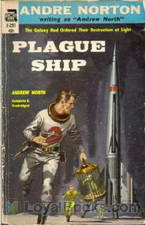 Plague Ship
Plague Ship
A Free Trader rocket ship heads for the remote planet, Sargol, which is blessed with immense natural wealth and precious gemstones. The ship is manned by the heroic Dane Thorson and his crew of intrepid space traders. On Sargol, they enter into complicated negotiations with the inhabitants of this strange planet. These feline people, the Salariki, are reluctant to enter into a business partnership with the free traders till they discover that the ship carries a small amount of catnip on board which they'd obtained from another trading post... | |
 Star Born
Star Born
If you've read and enjoyed The Stars Are Ours, you will certainly enjoy this exciting sequel! Star Born by Andre Norton was first published in 1957, two years after the previous book and is in itself a complete and riveting read. The theme depicts an early inter-stellar flight undertaken by people who call themselves the Free Scientists escaping from an oppressive regime on Earth. When Pax, a global authoritarian regime takes over the planet, it deems all space travel illegal. However this small group flees before the rules come into force... | |
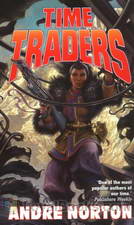 The Time Traders
The Time Traders
If it is possible to conquer space, then perhaps it is also possible to conquer time. At least that was the theory American scientists were exploring in an effort to explain the new sources of knowledge the Russians possessed. Perhaps Russian scientists had discovered how to transport themselves back in time in order to learn long-forgotten secrets of the past. That was why young Ross Murdock, above average in intelligence but a belligerently independent nonconformist, found himself on a “hush-hush” government project at a secret base in the Arctic... | |
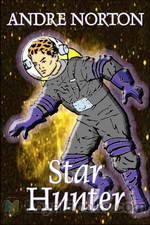 Star Hunter
Star Hunter
A science fiction novella depicting a thrilling cat-and-mouse game which plays out between a credulous young man and an interstellar safari leader, as the two take up an unanticipated adventure on the mysterious planet Jumala. Norton combines mind control, cunning schemes, interstellar travel, and alien intelligence in an action-packed adventure. The story unfolds with the introduction of Ras Hume, a pilot and Out-Hunter, who with the help of a criminal mastermind from the planet Nahuatl plans a conspiracy to secure a fortune by manipulating its supposed beneficiary... | |
 Key Out of Time
Key Out of Time
This is Book 4 in the Time Traders Series, In this book Ross Murdock and Arthur Ashe continue their adventures in Time and Space on the World of Hawaika. Hawaiian and Polynesian settlers help Ross and Ashe discover the way the world has changed from the data tape to present time. Helped by a girl (Karara) and her two trained dolphins (Tino-rau and Taua) | |
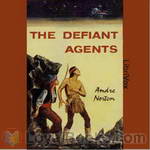 The Defiant Agents
The Defiant Agents
Travis Fox and a band of fellow Apache AmerIndians have their racial memories and survival abilities enhanced by the Redax machine and are sent to the planet Topaz, one of the few worlds of the ancient star empire that the US has voyage tapes to. But the Reds have “snooped” the tapes and get there first, and have a nasty surprise waiting for any ship that does not have the proper identification. Travis and some of his fellow Apaches survive the ensuing crash landing…but can they defeat the Reds and win Topaz for themselves? This work is a sequel to both The Time Traders and Galactic Derelict... | |
 Storm Over Warlock
Storm Over Warlock
The Throg task force struck the Terran survey camp a few minutes after dawn, without warning, and with a deadly precision which argued that the aliens had fully reconnoitered and prepared that attack. Eye-searing lances of energy lashed back and forth across the base with methodical accuracy. And a single cowering witness, flattened on a ledge in the heights above, knew that when the last of those yellow-red bolts fell, nothing human would be left alive down there. And so Shann Lantee, most menial of the Terrans attached to the camp on the planet Warlock, was left alone and weaponless in the strange, hostile world, the human prey of the aliens from space and the aliens on the ground alike... | |
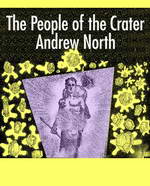 The People of the Crater
The People of the Crater
An air force pilot adrift in peacetime is recruited to join an Antarctic expedition. When a strange mist downs his plane he discovers an ancient alien civilization which has prophesized his arrival. Now he and his faithful pet Ana must descend to the depths of the crater and face the Black Ones in order to rescue the fair Thrala, daughter of the Ancient Ones. – Andre Norton (Alice Mary Norton) was a popular author of science fiction and fantasy who began publishing stories in the early 1930s. “The People of the Crater” was first published in volume 1 number 1 of Fantasy Book in 1947. | |
 All Cats Are Gray
All Cats Are Gray
| |
 Rebel Spurs
Rebel Spurs
In 1866, only men uprooted by war had reason to ride into Tubacca, Arizona, a nondescript town as shattered and anonymous as the veterans drifting through it. So when Drew Rennie, newly discharged from Forrest’s Confederate scouts, arrived leading everything he owned behind him—his thoroughbred stud Shiloh, a mare about to foal, and a mule—he knew his business would not be questioned. To anyone in Tubacca there could be only one extraordinary thing about Drew, and that he could not reveal: his name, Rennie... | |
 The Gifts of Asti
The Gifts of Asti
| |
 Ride Proud, Rebel!
Ride Proud, Rebel!
Drew Rennie, served as a cavalry scout in Confederate general John Hunt Morgan's command. He had left home in 1862 after a final break with his harsh grandfather, who despised him since his birth because of his mother's runaway marriage to a Texan. During the final year of conflict Drew has the additional responsibility of looking out for his headstrong fifteen-year-old cousin Boyd, who has run away from home to join Morgan's command and has a lot to learn in the school of hard knocks the army provides. The story follows the two of them and a new friend, Anson Kirby, through campaigns in Kentucky, Tennessee and later on deeper into the South, first with Morgan and later under Forrest. | |
 Ralestone Luck
Ralestone Luck
Rupert Ralestone is officially the Marquess of Lorne--but with no family money or prestige, the title is worthless. He and his younger brother and sister return to the old family homestead--Pirate's Haven. Their only hope is to find the family's talisman, a great sword, and restore it to its proper place. | |
 Time Traders, (Version 2)
Time Traders, (Version 2)
If it is possible to conquer space, then perhaps it is also possible to conquer time. At least that was the theory American scientists were exploring in an effort to explain the new sources of knowledge the Russians possessed. Perhaps Russian scientists had discovered how to transport themselves back in time in order to learn long-forgotten secrets of the past. That was why young Ross Murdock, above average in intelligence but a belligerently independent nonconformist, found himself on a "hush-hush" government project at a secret base in the Arctic... | |
 Defiant Agents (Version 2)
Defiant Agents (Version 2)
Operation Cochise: a carefully planned Western move to colonize a planet ahead of the Reds. Travis Fox had been an eager volunteer, but the morning he dragged himself half-conscious from the wrecked spaceship on the planet Topaz, he sensed the terror which would threaten the project. Travis never learned why the ship had crashed, nor why he and the other Apache agents had been shot into space without warning and under Redax control, a machine which had returned them to ancestral mentality. But the... | |
 Key Out of Time (version 2)
Key Out of Time (version 2)
Time Agents Ross Murdock and Gordon Ashe return for another assignment, this time to the tropical island paradise planet of Hawaika. Something apocalyptic has occurred in this planet’s history, altering its topography and cleansing it of all intelligent life. But something goes wrong when they attempt a peek at the past through a Time Gate, and with the Polynesian girl Karara and her trained dolphins Tino-rau and Taua, are plunged into a conflict between a dying super-race, barbarian natives, and invading aliens. | |
 Voodoo Planet (Version 2)
Voodoo Planet (Version 2)
A Free Trader space ship visits the planet Khatka where magic and Voodoo are threatening to destroy the promising civilization that has been slowly developing. The medic Tau uses his own knowledge of magic to help fight this menace but is it enough? Can he fight the very powerful Witch Doctor on his own territory? Listen and find out. | |
By: André Theuriet (1833-1907) | |
|---|---|
 A Woodland Queen
A Woodland Queen
| |
By: Andreas Latzko (1876-1943) | |
|---|---|
 Men in War
Men in War
| |
By: Andreas Wilhelm Cramer (1855-) | |
|---|---|
 Bremen Cotton Exchange 1872/1922
Bremen Cotton Exchange 1872/1922
| |
By: Andress Small Floyd (1873-1933) | |
|---|---|
 My Monks of Vagabondia
My Monks of Vagabondia
Before welfare or rehab, what happened to those unfortunates who lost their way, fell through the cracks, were cast off by society? Men such as Andress Floyd and his wife Lillian stepped up. In 1908, the philanthropists converted a mansion in New Jersey into a refuge for homeless men and during the more than 30 years of its operation, more than 100,000 men stayed there until they were able to get back on their feet. In this volume, Floyd has collected 13 diverse true tales of what brought some of the residents to seek succor and enlightenment at the Self-Mastery Colony. - Summary by Lynne Thompson | |
By: Andrew A. Bonar (1810-1892) | |
|---|---|
 The Biography of Robert Murray M'Cheyne
The Biography of Robert Murray M'Cheyne
| |
By: Andrew B. Paterson | |
|---|---|
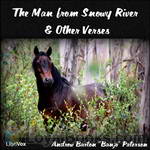 The Man from Snowy River and other Verses
The Man from Snowy River and other Verses
A collection of poems by Australian poet Andrew Barton ‘Banjo’ Paterson, picturesque glimpses into life in the Bush. From the preface: “A number of these verses are now published for the first time, most of the others were written for and appeared in ‘The Bulletin’ (Sydney, N.S.W.), and are therefore already widely known to readers in Australasia.” | |
 The Old Bush Songs
The Old Bush Songs
| |
 Bush Debate
Bush Debate
In 1892, two of Australia's best poets came up with a scheme to make some money. They arranged to have an argument in the Weekly Bulletin, and since they were being paid by the word, this let them fire back and forth, being sent beer money with each salvo. A couple of other poets also joined in, and their work is seminal to the development of the Bush ethos in Australia. The first eight files are the original form of the poems, and the second eight are later republications by the authors, in their own collections. | |
By: Andrew B. Smolnikar (1795-1869) | |
|---|---|
 Secret Enemies of True Republicanism
Secret Enemies of True Republicanism
| |
By: Andrew Barton Paterson (1864-1941) | |
|---|---|
 Not on It
Not on It
volunteers bring you 17 recordings of Not on It by Andrew Barton Paterson. This was the Weekly Poetry project for April 12, 2020. ------ This Weekly Poem is from the original collection SALTBUSH BILL, J.P., AND OTHER VERSES, which includes 43 poems by the author that are reprinted from various sources. The book formed part of the publisher's series of "Pocket Editions for the Trenches", designed to fit a serviceman's coat pocket. | |
 Man From Snowy River and Other Verses (version 2)
Man From Snowy River and Other Verses (version 2)
The Man from Snowy River and Other Verses is the first collection of poems by Australian poet Banjo Paterson. It was released in hardback by Angus and Robertson in 1895, and features the poet's widely anthologised poems "The Man from Snowy River", "Clancy of the Overflow", "Saltbush Bill" and "The Man from Ironbark". It also contains the poet's first two poems that featured in The Bulletin Debate, a famous dispute in The Bulletin magazine from 1892-93 between Paterson and Henry Lawson. The collection... | |
 Our Mat
Our Mat
volunteers bring you 15 recordings of Our Mat by A. B. Paterson. This was the Weekly Poetry project for July 14, 2019. ------ Banjo Paterson's speculations on a piece of prison craft. This poem references The Darlinghurst Gaol, a former Australian prison located in Darlinghurst, New South Wales. Australian poet Henry Lawson spent time incarcerated there during some of the turbulent years of his life and described the gaol as Starvinghurst Gaol due to meagre rations given to the inmates. It was closed in 1914 and has subsequently been repurposed to house the National Art School. | |
 Mountain Station
Mountain Station
volunteers bring you 12 recordings of A Mountain Station by Andrew Barton 'Banjo' Paterson. This was the Fortnightly Poetry project for April 4, 2021. ------ Andrew Barton "Banjo" Paterson, CBE was an Australian bush poet, journalist and author. He wrote many ballads and poems about Australian life, focusing particularly on the rural and outback areas, including the district around Binalong, New South Wales, his "Waltzing Matilda" is regarded widely as Australia's unofficial national anthem. This poem is taken from The Man from Snowy River and Other Verses by Andrew Barton 'Banjo' Paterson. - Summary by Wikipedia | |
 Lay Of The Motor-Car
Lay Of The Motor-Car
volunteers bring you 14 recordings of The Lay Of The Motor-Car by Andrew Barton Paterson. This was the Weekly Poetry project for August 29, 2021. ------ This Weekly Poem is taken from Saltbush Bill, J.P., and Other Verses by A. B. Paterson. - Summary by David Lawrence | |
By: Andrew Brown | |
|---|---|
 Company K, Twentieth Regiment, Illinois Volunteer Infantry Roster and Record
Company K, Twentieth Regiment, Illinois Volunteer Infantry Roster and Record
| |
By: Andrew Carnegie (1835-1919) | |
|---|---|
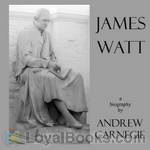 James Watt
James Watt
This biography of the inventor James Watt covers his early years, successes and failures, and legacy. | |
 Autobiography of Andrew Carnegie
Autobiography of Andrew Carnegie
This autobiography of Andrew Carnegie is a very well written and interesting history of one of the most wealthy men in the United states. He was born in Scotland in 1835 and emigrated to America in 1848. Among his many accomplishments and philanthropic works, he was an author, having written, besides this autobiography, Triumphant Democracy (1886; rev. ed. 1893), The Gospel of Wealth, a collection of essays (1900), The Empire of Business (1902), and Problems of To-day (1908)]. Although this autobiography was written in 1919, it was published posthumously in 1920. | |
 Round the World
Round the World
| |
 Gospel of Wealth
Gospel of Wealth
What is the proper mode of administering great wealth? It is to address this question that steel tycoon Andrew Carnegie's famous essay "Wealth", or more commonly known as "The Gospel of Wealth" was written . His answer – Philanthropy. Not just any philanthropy, but specifically, projects funded and overseen during the life of the magnate, for things that benefit the community and engage the public in maintaining long after the magnate is gone -- libraries, parks, universities, hospitals, medical labs, observatories, entertainment halls, swimming pools, etc... | |
 Empire of Business
Empire of Business
This collection of essays by Scottish-American steel industrialist Andrew Carnegie, gathered from various periodicals and first published in book form in 1902, provides insight into one of history’s richest and most notable entrepreneurs/philanthropists. Carnegie shares his outlook on the economic situation in America at the turn of the 20th century, the state of the US oil, coal, rail, and steel industries, the relationship between capital and labour, individualism vs. socialism, the public/private sector partnership, the upward climb of humanity into prosperity, the importance of land and population, trade and the best uses of tariffs, etc... | |
 Triumphant Democracy
Triumphant Democracy
Subtitled "Fifty Years' March of the Republic," this is steel tycoon Andrew Carnegie's love letter to America, first published in 1886, an impassioned celebration of the American success story, and a call for other nations to follow in America's footsteps. Through simple, direct discussions of the nature of the American character and her jobs and education, religion, industry, art and literature, foreign affairs, and more, Carnegie sets out a case for a brand of conservative democracy for the world to emulate... | |
By: Andrew Erskine (1739-1793) | |
|---|---|
 Critical Strictures on the New Tragedy of Elvira, Written by Mr. David Malloch
Critical Strictures on the New Tragedy of Elvira, Written by Mr. David Malloch
| |
By: Andrew F. Crosse | |
|---|---|
 Round About the Carpathians
Round About the Carpathians
| |
By: Andrew H. Walpole | |
|---|---|
 Black Star: A School Story for Boys
Black Star: A School Story for Boys
A school adventure set in Australia, with secret societies, bullies, mystery, a new student who calls everyone comrade, and sport, at least one handgun, and more. I only wish I could add an Australian accent! | |
By: Andrew J. Blackbird (1810-) | |
|---|---|
 History of the Ottawa and Chippewa Indians of Michigan A Grammar of Their Language, and Personal and Family History of the Author
History of the Ottawa and Chippewa Indians of Michigan A Grammar of Their Language, and Personal and Family History of the Author
| |
By: Andrew Jackson | |
|---|---|
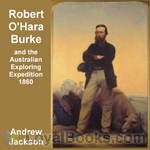 Robert O'Hara Burke
Robert O'Hara Burke
A non-fictional account of Burke and Wills’s 1860 expedition to cross the Australian continent from south to north and then return. Containing many excerpts from the diaries and accounts of the explorers, this book was published the year after the expedition met its disastrous end.(description written by trioptimum) | |
 State of the Union Address
State of the Union Address
| |
 State of the Union Addresses by United States Presidents (1829 - 1836)
State of the Union Addresses by United States Presidents (1829 - 1836)
The State of the Union address is a speech presented by the President of the United States to a joint session of the United States Congress, typically delivered annually. The address not only reports on the condition of the nation but also allows the President to outline his legislative agenda and national priorities. This album contains recordings of addresses from Andrew Jackson. | |
By: Andrew Jackson Howell (1869-1947) | |
|---|---|
 Money Island
Money Island
| |
By: Andrew Johnson (1808-1875) | |
|---|---|
 State of the Union Address
State of the Union Address
| |
 State of the Union Addresses by United States Presidents (1861 - 1868)
State of the Union Addresses by United States Presidents (1861 - 1868)
The State of the Union address is a speech presented by the President of the United States to a joint session of the United States Congress, typically delivered annually. The address not only reports on the condition of the nation but also allows the President to outline his legislative agenda and national priorities. This album contains recordings of addresses from Abraham Lincoln and Andrew Johnson. - Summary by Wikipedia and Linette Geisel | |
By: Andrew Kennedy Hutchison Boyd (1825-1899) | |
|---|---|
 The Recreations of a Country Parson
The Recreations of a Country Parson
| |
By: Andrew Kippis (1725-1795) | |
|---|---|
 Narrative of the Voyages Round the World, Performed by Captain James Cook : with an Account of His Life During the Previous and Intervening Periods
Narrative of the Voyages Round the World, Performed by Captain James Cook : with an Account of His Life During the Previous and Intervening Periods
| |
By: Andrew Lang (1844-1912) | |
|---|---|
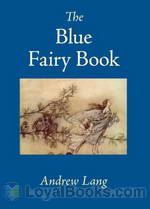 The Blue Fairy Book
The Blue Fairy Book
Published in 1889, The Blue Fairy Book is the first book in the series of story collections known as Andrew Lang's “Coloured” Fairy Books, which bring to life the classic fairytales by Grimm, Madame d'Aulnoy and Perrault among other folklore sources. Most captivating is the fact that the collection features the stories in pristine an unaltered conditions, therefore they contain a darker side than the polished versions most are familiar with from childhood memories. Featuring 37 tales, The... | |
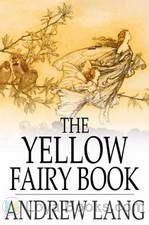 The Yellow Fairy Book
The Yellow Fairy Book
Published in 1894, The Yellow Fairy Book is the fourth installment in the series of fairytale collections known as Andrew Lang's “Coloured” Fairy Books and is comprised of stories collected from various foreign language sources including French, German, English, Scottish, Russian, and Polish. Moreover, the tales not only intend to entertain, but also offer an underlying didactic purpose, as many of the stories place an important emphasis on righteous behavior. Featuring 48 stories, The Yellow... | |
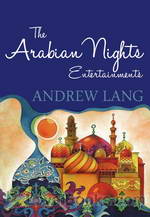 The Arabian Nights
The Arabian Nights
The Arabian Nights is a collection of Perso-Arabic folk tales and other stories. The collection, or at least certain stories drawn from it (or purporting to be drawn from it), became widely known in the West from the 18th century, after it was translated from the Arabic — first into French and then into English and other European languages. The first English language edition, based on Galland’s French rather than the original Arabic, rendered the title as The Arabian Nights’ Entertainment – and this, or simply The Arabian Nights, has been the title by which it has been best known to English-speaking people ever since. | |
 A Short History of Scotland
A Short History of Scotland
A Short History of Scotland is a consise introduction to the history of Scotland from Roman times to the last Jacobite rebellion, written by the author of a much longer Scottish history. | |
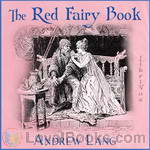 The Red Fairy Book
The Red Fairy Book
The Red Fairy Book is the second in a series of twelve books known as Andrew Lang’s Fairy Books or Andrew Lang’s “Coloured” Books. The series was immensely popular and proved of great influence in children’s literature, increasing the popularity of fairy tales over tales of real life. | |
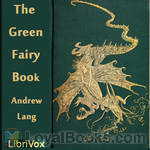 The Green Fairy Book
The Green Fairy Book
Andrew Lang's Fairy Books or Andrew Lang's "Coloured" Fairy Books constitute a twelve-book series of fairy tale collections. Although Andrew Lang did not collect the stories himself from the oral tradition, the extent of his sources, who had collected them originally (with the notable exception of Madame d'Aulnoy), made them an immensely influential collection, especially as he used foreign-language sources, giving many of these tales their first appearance in English. As acknowledged in the prefaces, although Lang himself made most of the selections, his wife and other translators did a large portion of the translating and telling of the actual stories... | |
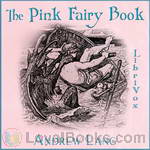 The Pink Fairy Book
The Pink Fairy Book
All people in the world tell nursery tales to their children, and the stories are apt to be like each other everywhere. A child who has read the Blue and Red and Yellow Fairy Books will find some old friends with new faces in the Pink Fairy Book. Courage, youth, beauty, kindness, have many trials, but they always win the battle; while witches, giants, unfriendly cruel people, are on the losing hand. So it ought to be, and so, on the whole, it is and will be; and that is all the moral of fairy tales... | |
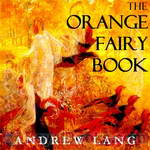 The Orange Fairy Book
The Orange Fairy Book
Andrew Lang's Fairy Books or Andrew Lang's "Coloured" Fairy Books constitute a twelve-book series of fairy tale collections. Although Andrew Lang did not collect the stories himself from the oral tradition, the extent of his sources, who had collected them originally (with the notable exception of Madame d'Aulnoy), made them an immensely influential collection, especially as he used foreign-language sources, giving many of these tales their first appearance in English. As acknowledged in the prefaces, although Lang himself made most of the selections, his wife and other translators did a large portion of the translating and telling of the actual stories... | |
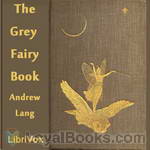 The Grey Fairy Book
The Grey Fairy Book
The tales in the Grey Fairy Book are derived from many countries—Lithuania, various parts of Africa, Germany, France, Greece, and other regions of the world. They have been translated and adapted by Mrs. Dent, Mrs. Lang, Miss Eleanor Sellar, Miss Blackley, and Miss hang. 'The Three Sons of Hali' is from the last century 'Cabinet des Fees,' a very large collection. The French author may have had some Oriental original before him in parts; at all events he copied the Eastern method of putting tale within tale, like the Eastern balls of carved ivory... | |
 HE
HE
This book is a parody of the famous swashbuckling novel, She, by H. Rider Haggard. Her beauties are beyond the reach of danger from Burlesque, nor does her form flit across our humble pages.” (taken from the Dedication) | |